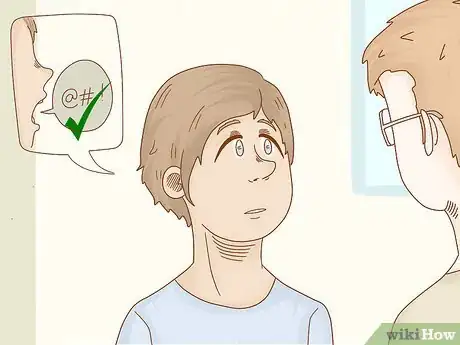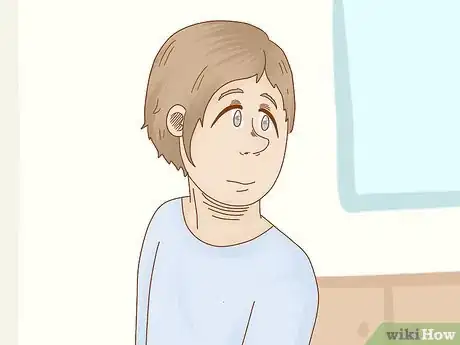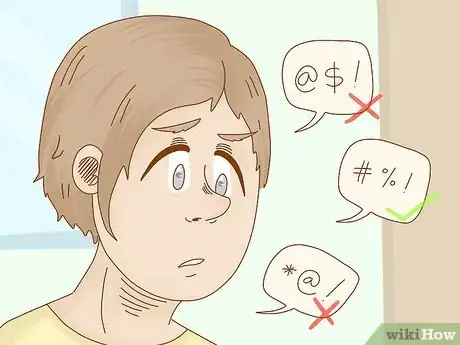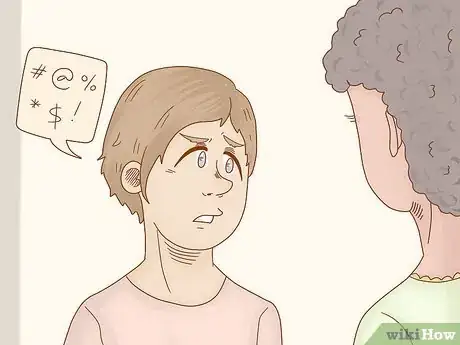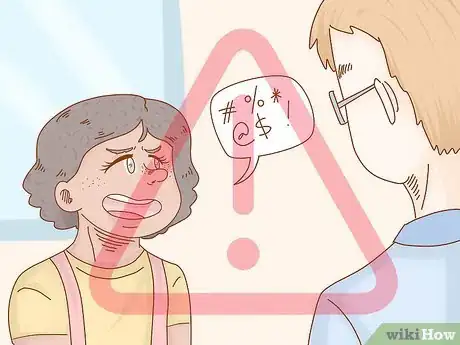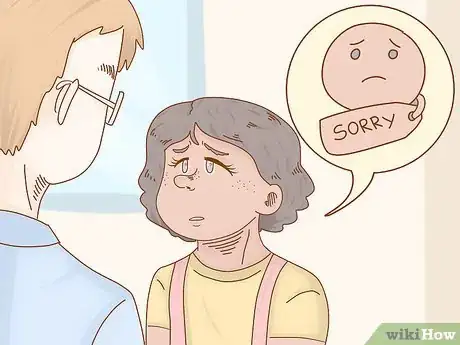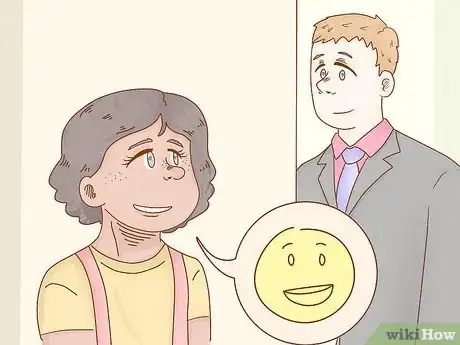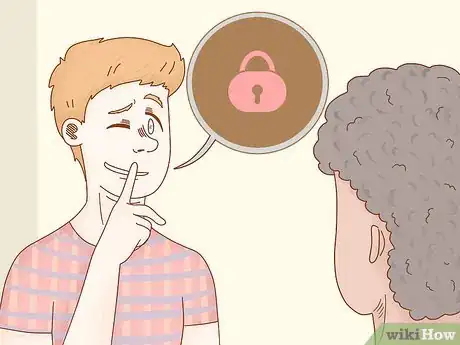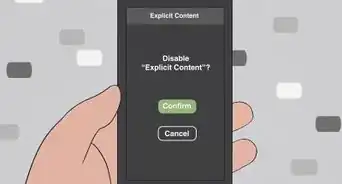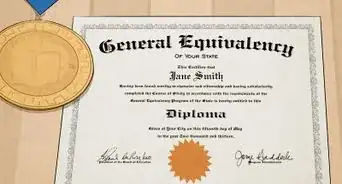This article was co-authored by wikiHow Staff. Our trained team of editors and researchers validate articles for accuracy and comprehensiveness. wikiHow's Content Management Team carefully monitors the work from our editorial staff to ensure that each article is backed by trusted research and meets our high quality standards.
There are 7 references cited in this article, which can be found at the bottom of the page.
This article has been viewed 88,291 times.
Learn more...
People have different ideas about using bad language. If you're young, cursing can get you into a lot of trouble. Using bad language can make you feel more grown up, and it can make you seem "cool." If you're not careful, however, cursing can very easily offend someone. There are certain times you should avoid using swear words, and if you're trying to stay out of trouble, there are certain places to avoid it, as well.
Steps
Staying Out of Trouble at Home
-
1Ask your parents what you're allowed to say. Sometimes, parents are more likely to allow certain words to be said than others. Having a serious conversation and setting ground rules for saying bad words could make your parents trust you more in the future. "Since communication is a two-way street, the way you talk can influence how well a parent listens and understands you."[1]
- You might want to say something in a polite tone, such as, "I feel like I'm getting old enough to say certain things I wasn't allowed to say before. I want to run this idea by you and see if you think there might be certain words I can say now that are less offensive than others."
- Remember that your parents may still reject your request for permission to use bad language. "But gracefully accepting a no can help you get more "yes" replies in the future."[2]
-
2Be conscious of who’s around you. If you swear at home, you’re giving everyone in your home the capability of hearing you. Make sure your parents are several rooms away before uttering a bad word.
- Also consider avoiding cursing in front of younger siblings, as they may try to mimic you in front of their parents. "Older siblings are more influential."[3]
Advertisement -
3Choose your words wisely. "As culture changes, so does what is taboo."[4] The word "taboo" just means something that is prohibited. Basically, some curse words are more accepted than others. It’s best if you determine a list of curse words that you find acceptable and won’t accidentally offend someone. Practice using those words, and avoiding the more offensive ones.
-
4Do not curse in front of your friends’ parents. Even if you’re not at home, other parents and adults can relay what you said back to your parents. You might think you are safe from being grounded, but your parents can find things out without you ever knowing.
Using Bad Language In School
-
1Avoid cursing during class or to your teacher. Remember, teachers are adults. Cursing in front of your teacher can result in being sent to the principal’s office. Each teacher is different and some might not resort to the harshest punishment, but it’s best to play it safe and just avoid cursing at all during class.
- Try to keep in mind that other students have different rules in their homes, and might be allowed to use bad language. When this spills over into the classroom, it may seem like it's okay to curse, but you should keep in mind: "You can hear it but you shouldn't use it."[5]
-
2Use bad language during busy times or class changes. It’s easier to get away with being overheard if there’s a lot going on. Unless a school official is standing right next to you, it’s less likely you’ll be punished for cursing if there’s a lot of people in the hall that need to be monitored and watched over until the next class begins.
- Some teachers admit to being more lenient about cursing in the halls. "Whether in the hall or classroom, when I hear an offensive word, I just call out to the individual(s), "Language please," in a polite tone and normally the immediate response from kids is "Oops, sorry!"[6]
-
3Apologize if a teacher overhears you. Sometimes, it just feels natural to let out a curse word if you drop a book or your backpack rips open. In these cases, if a teacher happens to overhear you and starts glaring at you, it’s best to just be sincere and apologize for the outburst. A teacher will likely let it slide if they don’t hear you cursing often.
- If a teacher happens to overhear you, it's best to look them in the eyes apologetically and say something like, "I'm very sorry I said that, it was completely out of frustration. I won't let it happen again."
-
4Practice being polite to school administrators. It’s easier to avoid using bad language around important people if you practice your manners. Make sure there’s a difference between how you speak with your friends and how you speak around school administrators. The most important people to speak politely with include:
- the Principal
- the Vice Principal
- Board of Education Members
- Secretaries
- School Nurses
- Teachers
- Coaches
- Student Teachers
Swearing With Your Friends
-
1Make sure your friends are OK with cursing. Some friends aren’t comfortable with bad language, and may become offended even when you’re not trying to insult them. Every parent has a different approach on growth and learning, so some people might be more welcoming of bad language, while others are put off by it. The last thing you want is to lose a friend based on the words you speak.
-
2Ask your friends to keep a secret. If a friend can’t keep a secret, then it’s not worth swearing around them. Also, it’s best to curse around friends who are also trying to get away with it. Being around friends who curse freely and openly make adults think you might be cursing when they’re not around, too.
- An added bonus to keeping secrets is a stronger bond with your friends. "Being able to keep a confidence builds people’s confidence in you, allowing the kinds of conversations that deepen a relationship."[7]
-
3Don’t get too used to cursing with your friends. Sometimes, you get too comfortable swearing with the people you trust. If this happens, you could end up accidentally cursing around your family. This is a quick and easy way to get yourself into trouble.
Community Q&A
-
QuestionWhat do I do if I curse around my friends' parents and they get offended?
 NetherYoda420Community AnswerApologize and promise not to do it again. Make sure to act more polite around them in the future.
NetherYoda420Community AnswerApologize and promise not to do it again. Make sure to act more polite around them in the future. -
QuestionMy dad curses a lot. It’s because he caught it from work. I once swore in front of him and well, we laughed. Me and my dad are Christian, so I don’t know.
 NetherYoda420Community AnswerIf you both think swearing is okay, then it is - but only in conversations that involve nobody but the two of you. If it makes you uncomfortable because of your religion, tell him. He will have to accept that and will most likely swear less around you (or, at least, try to). In general, only swear around people that are okay with that - and if you don’t want others to swear around you, tell them.
NetherYoda420Community AnswerIf you both think swearing is okay, then it is - but only in conversations that involve nobody but the two of you. If it makes you uncomfortable because of your religion, tell him. He will have to accept that and will most likely swear less around you (or, at least, try to). In general, only swear around people that are okay with that - and if you don’t want others to swear around you, tell them. -
QuestionHow to get away with swearing and excuses to make up if you are in trouble?
 NetherYoda420Community AnswerIf you are in trouble because of swearing, apologize to whoever is offended. Make sure to never curse around them again. In case you swear around a trusted person (like your parents or other close relatives), apologize and then tell them why you’re mad in a polite manner (repetitive swearing worsens the situation). For example say: “Sorry, I’m just so mad at (cause you are mad) because (why this makes you mad).” Then, most adults will be a little more understanding and might reply something like: “Well, that is a good cause to be angry, but still no reason to swear.” If an adults understands you, your chances of punishment are lower.
NetherYoda420Community AnswerIf you are in trouble because of swearing, apologize to whoever is offended. Make sure to never curse around them again. In case you swear around a trusted person (like your parents or other close relatives), apologize and then tell them why you’re mad in a polite manner (repetitive swearing worsens the situation). For example say: “Sorry, I’m just so mad at (cause you are mad) because (why this makes you mad).” Then, most adults will be a little more understanding and might reply something like: “Well, that is a good cause to be angry, but still no reason to swear.” If an adults understands you, your chances of punishment are lower.
Warnings
- Even when you’re older, some words aren’t widely accepted. Using these words may not result in punishment when you're an adult, but there is always consequences to using them.⧼thumbs_response⧽
References
- ↑ http://kidshealth.org/en/teens/talk-to-parents.html#
- ↑ http://kidshealth.org/en/teens/talk-to-parents.html#
- ↑ http://www.npr.org/sections/health-shots/2013/04/29/179266284/Big-Siblings-Big-Influence-Some-Behaviors-Run-In-The-Family
- ↑ http://harvardsciencereview.com/2014/01/23/the-science-of-swearing/
- ↑ http://www.theguardian.com/teacher-network/teacher-blog/2013/apr/22/schools-swearing-behaviour-teaching
- ↑ http://www.nea.org/tools/16342.htm
- ↑ https://lifereimagined.aarp.org/stories/17281-Build-Trust-and-Confidence-Keep-That-Secret
- ↑ http://io9.gizmodo.com/why-its-easier-to-swear-at-people-in-another-language-1536262864
